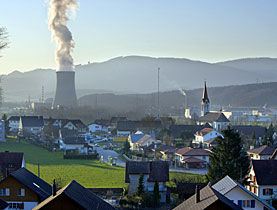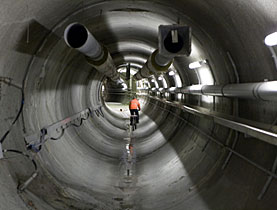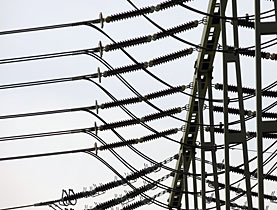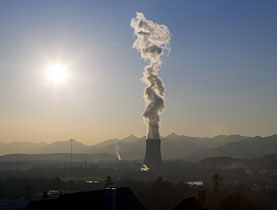Nuclear firm funding for cancer study questioned

A study to investigate whether living close to a nuclear power plant increases the risk of childhood cancer is being co-financed by electricity companies.
The decision to allow the firms, Axpo and BKW Energy, to fund around a quarter of the SFr820,000 ($672,000) study raises questions about whether they will try to influence the results, due to be published in 2011.
Axpo and BKW Energy support nuclear energy along with a mix of other non-renewable and renewable sources. Last Thursday, they submitted plans to replace the country’s oldest nuclear plants with two new facilities.
They argued that this was a solution to a foreseeable power shortfall when the old plants reach the end of their life spans.
However, negative results from the childhood cancer study could have a devastating impact on their nuclear ambitions.
The results of a study by the government in Germany published one year ago found a much higher rate of cancer, such as leukaemia, among children living within five kilometres of nuclear power stations.
The Swiss study, commissioned in September by the Federal Health Office and the Swiss Cancer League, is attempting to answer roughly the same questions.
History of residence
The Institute for Social and Preventive Medicine at Bern University will look at the health records of all children born between 1985 and 2007 in Switzerland and compare their “lifetime history of residence”.
The question now being raised is why the government allowed the electricity firms on board as sponsors. Their involvement was accepted under the condition that they do not try to influence the results, said Werner Zeller of the health office.
“Should taxpayers’ money be used if industry is willing to co-finance the study?” Zeller asked rhetorically. “An external advisory board of international experts will guarantee the independence of the study.”
Claudia Kuehni of the Institute for Social and Preventive Medicine is also convinced that Axpo and BKW Energy will not abuse their position as sponsors. “We haven’t yet felt any pressure,” Kuehni said.
Independent
“To conduct purely scientific research, we avoided selecting either nuclear industry representatives or nuclear opponents to sit on the advisory board,” she added.
However, critics such as Martin Walter say the issue is about politics as much as science.
Walter, a member of the board of the non-governmental organisation, International Physicians for the Prevention of Nuclear War, said there is no such thing as neutral financing. “Anyone funding a study has influence, either directly or indirectly.”
This is often the case with research carried out for the pharmaceutical industry. Negative results for medications, Walter explained, are simply not publicised.
He is surprised that no scientists from Britain’s Committee on Medical Aspects of Radiation in the Environment were chosen to sit on the advisory board. “No one is represented from this group of experts even though they have studied leukaemia intensively.”
BKW Energy says the company is involved only as a “patron” while Axpo insists it will not try to “exploit the study”.
But Sebastian Vogler of BKW Energy questioned the methods used in the German research. “We need to have reliable results,” he said.
Parliament is due to debate the replacement of the country’s nuclear power stations in 2012. A decision could be put off for a year or two if opponents launch a referendum.
And by that time, the anti-nuclear lobby will have more wind in its sails if the results of the Swiss study on childhood cancer confirm Germany’s findings.
swissinfo, based on an article in German by Corinne Buchser
The study aims to determine if children who grow up near nuclear power plants have an increased risk to develop childhood cancer and particularly leukemia.
The study will also examine the influence of other factors including electromagnetic fields or industrial emissions.
It will look into the health records of all children born between 1985 and 2007 in Switzerland. Lifetime history of residence will be compared between children who developed cancer and all other children in the country.
The data on children with cancer comes from the Swiss Childhood Cancer Registry, which contains information on all children diagnosed with cancer in Switzerland since 1976.
In total, 2,957 children born between 1985 and 2007 were diagnosed with cancer, including 981 leukemia cases.
Switzerland has five nuclear power plants which account for about 40% of domestic electricity production.
About 1% of the population lives within 5km of a nuclear power plant and approximately 10% live within 15km.
In 1990, Swiss voters approved a ten-year moratorium on new nuclear facilities. The decision came only a few years after the Chernobyl disaster.
By 1998, the government had decided in principle that Switzerland would abandon nuclear power.
But at the end of the moratorium, the pro-nuclear lobby began calling for new plants, saying it would help cut production of greenhouse gases and dependency on fossil fuels.
In 2003, voters rejected two proposals, one calling for a new moratorium, another demanding the end to Swiss nuclear energy.
The nuclear energy law introduced in 2005 confirms that atomic power is not dead, but submits any new projects to a possible nationwide vote.
In 2007, the cabinet decides to replace existing nuclear power plants and build gas plants to avoid an energy shortfall.

In compliance with the JTI standards
More: SWI swissinfo.ch certified by the Journalism Trust Initiative



You can find an overview of ongoing debates with our journalists here. Please join us!
If you want to start a conversation about a topic raised in this article or want to report factual errors, email us at english@swissinfo.ch.